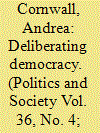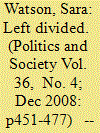| Srl | Item |
| 1 |
ID:
085013


|
|
|
|
|
| Publication |
2008.
|
| Summary/Abstract |
Opposition within the organic agriculture community to a state regulatory initiative intended to close a loophole on the prohibition of stoop labor in California agriculture illuminates critical tensions around the "labor question" underpinning California's rapidly expanding organic sector. Through an exploration of the contradictions between the political economic realities of organic agriculture, the lived realities of farm workers, and the ideological framework of "agricultural exceptionalism" espoused in the organic community, this article challenges widely held assumptions that organic agriculture embodies a more socially sustainable form of production. We conclude that these tensions must be confronted if any progress is to be made toward the incorporation of social justice into definitions of agro-food system sustainability
|
|
|
|
|
|
|
|
|
|
|
|
|
|
|
|
| 2 |
ID:
085014


|
|
|
|
|
| Publication |
2008.
|
| Summary/Abstract |
Brazil's health councils appear to offer inspiring examples of what Fung and Wright (2003) term "empowered participatory governance." But what happens in practice? This article narrates an episode in the life of a municipal health council in northeast Brazil, in which democracy itself came under deliberation. It seeks to locate normative assumptions embedded in theories of deliberative democracy and participatory governance in everyday conduct in one of these institutions. It suggests that assessing the democratizing potential of the myriad new spaces that now populate governance landscapes the world over calls for far closer attention to be paid to power, political culture, and politics.
|
|
|
|
|
|
|
|
|
|
|
|
|
|
|
|
| 3 |
ID:
085015


|
|
|
|
|
| Publication |
2008.
|
| Summary/Abstract |
For well over a millennium, public institutions have sought to limit the spread of disease. This article claims that shared political narratives about collective solidarity and belonging expressed in ideas about citizenship (who is responsible for what; who has rights; who has access; who belongs) shape and constrain public health interventions. While a Sanitarian medical paradigm fit the mid-nineteenth-century British citizenship regime better than one based on limiting contagion by quarantine, full implementation of the "sanitary idea" had to wait upon adjustments after 1870 in the predominantly liberal citizenship regime, and particularly in the institutions of governance and ideas about the responsibility mix
|
|
|
|
|
|
|
|
|
|
|
|
|
|
|
|
| 4 |
ID:
085012


|
|
|
|
|
| Publication |
2008.
|
| Summary/Abstract |
This article challenges dominant explanations in the comparative political economy literature on the origins and purposes of social protection. Far from being a tool of working-class mobilization, social protection in southern Spain was strategically employed by a left party to politically demobilize its supposedly "natural" constituencies. This peculiar outcome is the result of a setting that is common in welfare states outside of northern Europe: the context of a divided left, in which parties and unions are seeking to mobilize different constituencies and in which left parties are themselves divided between moderate and far-left groups. The result in Spain was that social policy became a weapon in parties' efforts to undermine their political competition. This suggests the need to rethink the received wisdom about what the welfare state does to build working-class power in the context of a divided left
|
|
|
|
|
|
|
|
|
|
|
|
|
|
|
|